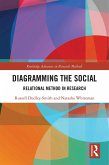Dieser Download kann aus rechtlichen Gründen nur mit Rechnungsadresse in A, B, BG, CY, CZ, D, DK, EW, E, FIN, F, GR, HR, H, IRL, I, LT, L, LR, M, NL, PL, P, R, S, SLO, SK ausgeliefert werden.
Ray Wilkinson, Professor of Human Communication, University of Sheffield, UK
"This impressive and broad-ranging book illuminates the importance of historical contextualizations of research in social sciences. Central to this project is the concept of dialogical networks showing how identity, stereotype, and prejudice are reported in interactions of everyday talk, and how continuities, changes and disruptions take place over time."
Ivana Markova, University of Stirling, UK
"This is a must read for anyone interested in dialogical networks. Ivan Leudar and Jiri Nekvapil apply their innovative theoretically and methodologically expansive approach to unpack how we - as everyday historians - bring the past into our present and make this consequential. This is not done as an end in its own right but to address controversial social issues such as how social identities are managed, attempts to change these identities and the real consequences of these practices (e.g. Restricting Roma's freedom of abode and movement)."
Rose McCabe, City, University of London, UK
"This very innovative book presents both a collection of master pieces on the concept of dialogical networks, and a reflexive history of an aspect of the social sciences in the making. As such, it is a major resource for senior and junior scholars who will find substantial information as well as epistemological thoughts regarding the practice of research."
Baudouin Dupret, CNRS, France/UCLouvain, Belgium









